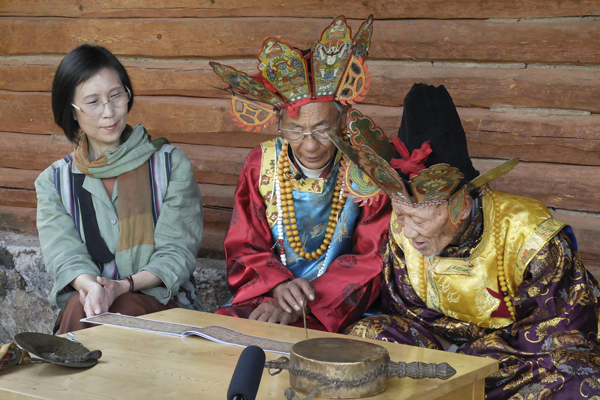Digital technology applied to save endangered culture
- By Wu Jin
 0 Comment(s)
0 Comment(s) Print
Print E-mail China.org.cn, September 26, 2014
E-mail China.org.cn, September 26, 2014
In a remote southwestern mountainous area in China's Yunnan Province live the two remaining fully-skilled ritual organizers (shamans) of the Naxi ethnic group, who are probably the only hope for the continuation of the ancient Dongba Culture, a symbolic religious tradition awaiting future generations to inherit.
However, as the two shamans -- 87-year-old He Zhiben and 72-year-old Xi Shanghong -- are becoming senile, the unique ethnic culture is under threat. Experts paying special attention to Dongba Culture have brought copies of the preserved books written in the Naxi pictographic script back to the region from as far afield as Berlin, London and Washington.
"Time is running out. The few experienced and knowledgeable Dongba shamans who have mastered the pictographs and promoted their original religious ceremony may disappear totally in the near future," said Zhang Xu, professor from the Beijing Association of Dongba Culture and Arts (ADCA) at a panel discussion yesterday on the digital preservation of Naxi Dongba Culture.
With its unique location between Tibet, Sichuan, and the neighboring country India, the Naxi ethnic group has assimilated numerous cultural influences over the centuries and has risen to prominence in the international academic circle thanks to Joseph Rock, dubbed the father of modern Naxi Studies.
Rock conducted a comprehensive analysis of Naxi culture, linguistics and geography, since he first ventured to Lijiang in 1922, where most Naxi people live. His engagement in the culture aroused immense interest among anthropologists and archaeologists who later established several academic centers for Naxi studies in countries such as the United States, Britain, France and Germany. Consequently, many books of Naxi texts, delineating religious rituals, mythologies and fables, were transferred to Western countries.
But the outflow and massive destruction of the manuscripts in China's turbulent history caused great losses of cultural heritage among the indigenous villagers. That is why when Zhang presented some copies of the exquisite manuscripts from the British Museum, the two shamans were overwhelmed by the sudden revival of the long-lost memory.







Go to Forum >>0 Comment(s)